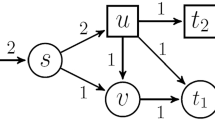Abstract
Let a communication network be modelled by a directed graph G = (V,E) of n nodes and m edges. We consider a one-round two-player network pricing game, the Stackelberg Shortest Paths Tree (StackSPT) game. This is played on G, by assuming that edges in E are partitioned into two sets: a set E F of edges with a fixed positive real weight, and a set E P of edges that should be priced by one of the two players (the leader). Given a distinguished node r ∈ V, the StackSPT game is then as follows: the leader prices the edges in E P in such a way that he will maximize his revenue, knowing that the other player (the follower) will build a shortest paths tree of G rooted at r, say S(r), by running a publicly available algorithm. Quite naturally, for each edge selected in the solution, the leader’s revenue is assumed to be equal to the loaded price of an edge, namely the product of the edge price times the number of paths from r in S(r) that use it. First, we show that the problem of maximizing the leader’s revenue is NP-hard as soon as |E P | = Θ(n). Then, in search of an effective method for solving the problem when the size of E P is constant, we focus on the basic case in which |E P | = 2, and we provide an efficient O(n 2 logn) time algorithm. Afterwards, we generalize the approach to the case |E P | = k, and we show that it can be solved in polynomial time whenever k = O(1).
Part of this work has been developed while the third author was visiting ETH.
Preview
Unable to display preview. Download preview PDF.
Similar content being viewed by others
References
Agarwal, P.K., Erickson, J.: Geometric range searching and its relatives. In: Chazelle, B., Goodman, J.E., Pollack, R. (eds.) Advances in Discrete and Computational Geometry. Contemporary Mathematics, vol. 23, pp. 1–56. American Mathematical Society Press, Providence (1999)
Briest, P., Hoefer, M., Krysta, P.: Stackelberg network pricing games. In: 25th Annual Symposium on Theoretical Aspects of Computer Science (STACS), pp. 133–142 (2008), http://drops.dagstuhl.de/opus/volltexte/2008/1340
Cardinal, J., Demaine, E.D., Fiorini, S., Joret, G., Langerman, S., Newman, I., Weimann, O.: The Stackelberg minimum spanning tree game. In: Dehne, F., Sack, J.-R., Zeh, N. (eds.) WADS 2007. LNCS, vol. 4619, pp. 64–76. Springer, Heidelberg (2007)
Cormen, T.H., Leiserson, C.E., Rivest, R.L., Stein, C.: Introduction to Algorithms. MIT Press and McGraw-Hill (2001)
Grigoriev, A., van Hoesel, S., van der Kraaij, A., Uetz, M., Bouhtou, M.: Pricing network edges to cross a river. In: Persiano, G., Solis-Oba, R. (eds.) WAOA 2004. LNCS, vol. 3351, pp. 140–153. Springer, Heidelberg (2005)
Labbé, M., Marcotte, P., Savard, G.: A bilevel model of taxation and its application to optimal highway pricing. Management Science 44(12), 608–622 (1998)
Malik, K., Mittal, A.K., Gupta, S.K.: The k most vital arcs in the shortest path problem. Oper. Res. Letters 8, 223–227 (1989)
Nisan, N., Roughgarden, T., Tardos, E., Vazirani, V.V. (eds.): Algorithmic Game Theory. Cambridge University Press, New York (2007)
Roch, S., Savard, G., Marcotte, P.: An approximation algorithm for Stackelberg network pricing. Networks 46(1), 57–67 (2005)
van Hoesel, S.: An overview of Stackelberg pricing in networks. European Journal of Operational Research 189(3), 1393–1402 (2008)
von Stackelberg, H.: Marktform und Gleichgewicht (Market and Equilibrium). Verlag von Julius Springer, Vienna, Austria (1934)
Author information
Authors and Affiliations
Editor information
Editors and Affiliations
Rights and permissions
Copyright information
© 2008 Springer-Verlag Berlin Heidelberg
About this paper
Cite this paper
Bilò, D., Gualà, L., Proietti, G., Widmayer, P. (2008). Computational Aspects of a 2-Player Stackelberg Shortest Paths Tree Game. In: Papadimitriou, C., Zhang, S. (eds) Internet and Network Economics. WINE 2008. Lecture Notes in Computer Science, vol 5385. Springer, Berlin, Heidelberg. https://doi.org/10.1007/978-3-540-92185-1_32
Download citation
DOI: https://doi.org/10.1007/978-3-540-92185-1_32
Publisher Name: Springer, Berlin, Heidelberg
Print ISBN: 978-3-540-92184-4
Online ISBN: 978-3-540-92185-1
eBook Packages: Computer ScienceComputer Science (R0)




